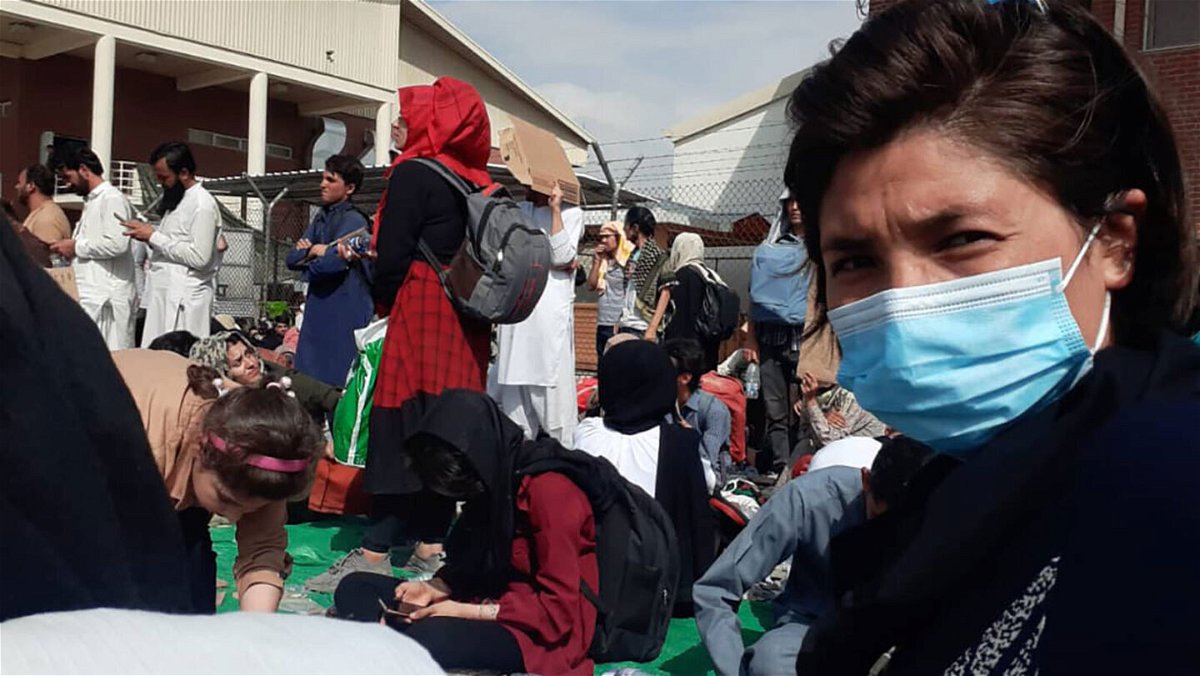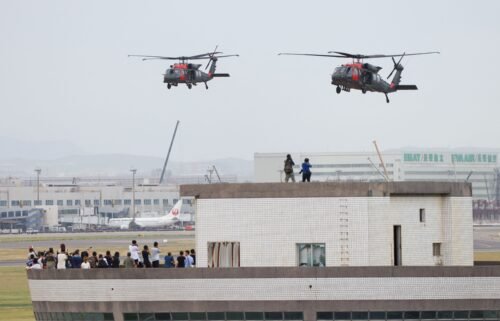‘It was just mayhem and chaos’

Raihana Raha trudged through a drainage canal to get into Kabul airport and onto an evacuation flight.
By Ivana Kottasová, Joseph Ataman, Jo Shelley, Saskya Vandoorne, Madalena Araujo and Nilly Kohzad, CNN
(CNN) — When the Taliban recaptured Afghanistan, tens of thousands of civilians decided to flee their homes.
Translators, military contractors, public officials, journalists, human rights activists, employees of foreign NGOs and many others suddenly found themselves at risk. Many had direct links to the United States and its allies and feared the militant group would seek their revenge against them after the US withdrawal.
Others were afraid the freedoms they got used to in the past two decades would quickly disappear under Taliban rule. Many felt the safety of their families was in jeopardy.
More than 120,000 people have been evacuated from Afghanistan since late July, according to the White House. Now that the US and its allies have ended their airlift missions, it has become clear that many vulnerable Afghans were left behind.
Some didn’t make it to the airport on time. Others never had an opportunity to leave. Some simply chose to stay and fight for their rights. Here are stories of some of those who escaped — and those who didn’t make it.
I walked through drainage canal to get to the airport
Raihana Raha got into the Kabul airport with the assistance of French soldiers after walking through a drainage canal, knee deep in waste water.
Days later, in the safety of a hotel in Paris, she was still worried people could smell it on her.
Raha, a 25-year-old women’s rights activist, fled Afghanistan shortly after the Taliban captured Kabul. She didn’t sleep at home, hiding instead at a friend’s house. Once she received her visa she headed to the airport along with a group of other women in a similar situation.
She still finds it difficult to describe what she was thinking during the three treacherous days she spent waiting outside the Hamid Karzai International Airport. “All that I could do was just, you know, [be] strong and do what I could do … it was all about chances. It was about trying to find a chance,” she said.
When Raha got inside the airport, it struck her how quiet it became.
“The people, when they get to the airport, they were silent, most of them were silent, it seemed like they were thinking about what’s happened to them, what happened to their country, what’s happening to their lives, you know, because most of them, they were the people who were working, the people who had a lot of plans to make their dreams [come true],” she told CNN.
It finally hit her on the plane. She was leaving her country.
“A lot of people were sitting on the floor, most of the people there were crying and I could feel why they were crying, because they were thinking about how they are leaving their country and for what, and why they’re leaving,” she said.
Raha herself isn’t a big crier, she said. At least, not normally. “It’s not easy for me to cry, sometimes in the past, when I was trying to cry, I couldn’t, I don’t know why, I just couldn’t, but on that day, I couldn’t stop myself,” she said. “Of course I cried.”
I told my son the gunfire was a celebration
Rafiullah Stanikzai and his family also spent three days and three nights hiding outside the airport, covering their faces whenever Taliban fighters passed by. At one point, the fighters kicked and threatened him, ordering him to leave.
His 4-year-old son Mohammad was crying, terrified of the near-constant shooting. To soothe him, Stanikzai told Mohammad the gunfire was just a celebration.
Stanikzai, a 33-year-old former translator, had previously worked for the Czech unit of the NATO-led security mission in Afghanistan. He said that, until a few weeks ago, he and his family had a good life in Afghanistan. His wife Maryam was lecturing at a university, and he had a good job.
He said he was finally escorted through the Taliban checkpoint at the airport by Czech soldiers who later led him towards a plane he believed he’d be boarding. “And then suddenly, [they] left us exactly in front of the airplane, saying that the plane is full and didn’t give information about any other plane,” he said.
The plane took off, with Stanikzai and his family left on the tarmac. The Czech Republic’s foreign and defense ministries told CNN that Stanikzai was not eligible for evacuation because he was excluded from the government’s resettlement program for Afghan contractors in 2013 — something Stanikzai said the Czechs never told him, pointing to recommendation letters and other documents the Czech army provided him with.
The family spent another cold night queuing for a place on a US flight out of Kabul, waiting patiently to get through US passport clearance and a security screening. Eventually, they were taken to Qatar, spending a few days there before being sent to Germany and later onto the US.
I was running towards the airport
Peymana Assad recalls seeing hundreds of people surrounding the military convoy that was taking her to safety.
“Children, women, little kids, little girls just standing on both sides … you had three British soldiers on one side, three British soldiers on the other side, just pointing guns at these people to stop them from creating a stampede and running at the gate once the gates opened to let the convoys in,” she told CNN.
Assad, who was visiting her Afghan family from the UK, said the neighbors came knocking after learning the Taliban were taking over Kabul. They told her she needed to leave immediately. The roads were already completely blocked with people desperately trying to escape and if the Taliban came and took over the district, she would be unable to leave.
“So that’s when I grabbed my hand luggage. I got out on foot, on the back streets onto the main dual carriageway towards the airport, towards Kabul airport, and started walking and running,” she said.
There were hundreds of people around, all running towards the airport. “It was just mayhem and chaos and panic and the complete fear,” Assad said, remembering one particularly terrifying moment.
“One of the shopkeepers pointed at me and he said, ‘If the Taliban catch you, they’re going to kill you.'”
Assad realized that she stood out in her fancy Afghan dress and Nike sneakers. “I looked so different to everyone else. I looked completely foreign … and that just put more fear in my heart and I just started walking faster,” Assad said.
Hours later, in the safety of the airport and about to board the government flight, Assad glanced at a television set in the waiting area. “The Taliban were in the presidential palace … the Taliban had taken control of Kabul,” she said.
It’s as much my country as it’s theirs
Unlike many others in her position, Pashtana Durrani, the founder and executive director of Learn, a nonprofit organization focused on education and women’s rights, never really considered leaving Afghanistan, despite the risks she might face.
“There are a lot of people depending me … 7,000 girls still need lessons and if I am not there, they won’t get it, so for me it’s very important to fight for their rights … not every person can leave, not every person has a privilege to leave,” she told CNN.
The 23-year-old is currently in hiding in Afghanistan, focused on enrolling as many children into digital learning programs as possible, before “things get worse” under the Taliban, she said.
“My family forced me into hiding, a lot of people are concerned about my safety …. I personally am not afraid of them. It’s as much my country as it’s theirs,” she said.
Durrani said she worries about the safety and the future of the women and girls. She questions the Taliban’s commitment to protect their rights.
“We are told that we have to stay home until the Taliban fighters accept women in public spaces … but what if they never get comfortable with women, what then, what is the deadline?,” she said.
Durrani, a young, educated Afghan woman, said she feels it’s her responsibility to stay and challenge the Taliban.
“Right now we fight back. We ask for our rights. It’s important. If we don’t speak now, we are the educated generation, the next generation won’t even be educated … that’s not supposed to be happening, not on my watch.”
I haven’t been to work since they took over
Meanwhile, in the western city of Herat, a young journalist in her 30s says her life and work have been on hold since the Taliban takeover.
“The atmosphere is tragic and full of pain and suffering. Before the arrival of the Taliban, I would go to work, but since then, it has been a dark day, a dark day for Afghans and Afghan journalists when Herat fell,” she told CNN.
The journalist said she had not been to work since the Taliban took over Herat.
“Our local newspaper is on a break and we are not printing anything. [The] Taliban has asked women to stay home. Same with schools. Schools are operating but not in the same quality as before. The future is unclear.”
The arrival of the Taliban, she said, had changed everything. “I am thinking of my future every second of the day. I have two kids, what will happen to their future? Will they be safe? Will they be alive? Will the Taliban start killings and executions like before? Will they put women in cages?,” she said.
The-CNN-Wire
™ & © 2021 Cable News Network, Inc., a WarnerMedia Company. All rights reserved.


